 Your new post is loading...
 Your new post is loading...

|
Scooped by
Robin Good
|
I’m seeing more Scoopit links in my Twitter stream and I’m not crazy about it. Sure it’s quick and easy to share with Scoopit. But it not quick and easy to consume. For me it's all about the econ...
Marty Note (here is comment I wrote on Dr. V's blog) Appreciate Bryan’s and Joseph’s comment, but I rarely use Scoop.it as a pass through. More than 90% of the time I’m adding “rich snippets” to content I Scoop.
Rich snippets are “blog” posts that fall between Twitter and the 500 to 1,000 words I would write in Scenttrail Marketing. I often create original content ON Scoop.it because whatever I’m writing falls in the crack between Twitter’s micro blog and what I think of as needing to be on my marketing blog.
I was taught NOT to pass through links on Scoop.it early on by the great curator @Robin Good . Robin has well over 1M views on Scoop.it now and his advice along with the patient advice of other great Scoop.it curators has my profile slouching toward 150,000 views.
Bryan is correct that some curators new to Scoop.it haven’t learned the Robin Good lesson yet. I agree it is frustrating to go to a link and not receive anything of value back, to simply need to click on another link. Curators who pass through links won’t scale, so the Darwinian impact will be they will learn to add value or die out.
For my part I always identify my Scoop.it links, probably about half the content I Tweet and about a quarter of my G+ shares. I also routinely share my favorite “Scoopiteers”, great content curators who taught me valuable lessons such as don’t simply pass through links but add “micro blogging” value via rich snippets.
When you follow or consistently share content from a great curator on Scooop.it you begin to understand HOW they shape the subjects they curate. I know, for example, Robin Good is amazing on new tools. Scoop.it anticipated this learning and built in a feature where I can suggest something to Robin.
This is when Scoop.it is at its most crowdsourcing best because I now have an army of curators who know I like to comment on and share content about design or BI or startups and they (other Scoopiteers) keep an eye out for me. There are several reasons Scoop.it is a “get more with less effort” tool and this crowdsourcing my curation is high on the list.
So, sorry you are sad to see Scoop.it links and understand your frustration. You’ve correctly identified the problem too – some curators don’t know how to use the tool yet. I know it is a lot to ask to wait for the Darwinian learning that will take place over generations, but Scoop.it and the web have “generations” that have the half life of a gnat so trust that the richness of the Scoop.it community will win in the end and “the end” won’t take long.
To my fellow Scoop.it curators we owe Bryan and Joseph thanks for reminding us of what Robin Good taught me – add value or your Scoop.it won’t scale. That lessons is applicable to much more than how we use Scoop.it.
Marty
Added to G+ too
https://plus.google.com/102639884404823294558/posts/TUsNtsAsjWp
Via Martin (Marty) Smith

|
Scooped by
Robin Good
|
"The Motley Fool - As choice becomes overwhelming, the winners of the future retail war will be the ones who can help guide customers to the perfect products."

|
Scooped by
Robin Good
|

|
Scooped by
Robin Good
|
Robin Good: If you seriously and systematically curate a topic, your work may be soon considered as good as collector's art, not because of the individual value of each piece you include, but thanks to your ability to orchestrate a strong and consistent "theme".
In this article inspired by the Three Graces photographic collection who was recently bought by New York collector Peter J. Cohen, Deanna Alshad writes how much she likes Stephanie Terelak as she captures the essence of this photograph collection: "The lines of collector, curator, and artist are blurred in this case.
Individually, these photographs are worth very little, probably a few dollars on ebay I would guess.
But amassed, sorted, and curated in large specific groups, seemingly worthless stuff on ebay becomes art and the collector becomes artist, selecting each piece to belong to a greater whole that our best museums’ curators deemed worthy of their walls."
And then she adds: "This can nearly be said of any collection. Collections are works of art, like collages or mixed media projects — or bonsai trees.
Often continuously in process, collections are nearly alive with the story narrated by each individual collector’s act of collecting.
Each curates — feeds and prunes — for meaning and growth as well as with an artistic eye, to tell stories with objects."
Inspiring. Rightful. 8/10
Full article: http://www.inherited-values.com/2012/08/collectors-are-like-artists-collections-like-works-of-art/

|
Scooped by
Robin Good
|
Robin Good: Must-read article on ClutterMuseum.com by Leslie M-B, exploring in depth the opportunity to have students master their selected topics by "curating" them, rather than by reading and memorizing facts about them.
"Critical and creative thinking should be prioritized over remembering content"
"That students should learn to think for themselves may seem like a no-brainer to many readers, but if you look at the textbook packages put out by publishers, you’ll find that the texts and accompanying materials (for both teachers and students) assume students are expected to read and retain content—and then be tested on it.
Instead, between middle school (if not earlier) and college graduation, students should practice—if not master—how to question, critique, research, and construct an argument like an historian."
This is indeed the critical point. Moving education from an effort to memorize things on which then to be tested, to a collaborative exercise in creating new knowledge and value by pulling and editing together individual pieces of content, resources and tools that allow the explanation/illustration of a topic from a specific viewpoint/for a specific need.
And I can't avoid to rejoice and second her next proposition: "What if we shifted the standards’ primary emphasis from content, and not to just the development of traditional skills—basic knowledge recall, document interpretation, research, and essay-writing—but to the cultivation of skills that challenge students to make unconventional connections, skills that are essential for thriving in the 21st century?"
What are these skills, you may ask. Here is a good reference where to look them up: http://www.p21.org/storage/documents/P21_Framework_Definitions.pdf (put together by the Partnership for 21st Century Skills)
Recommended. Good stuff. 9/10
Full article: www.cluttermuseum.com/make-students-curators/
(Image credit: Behance.net)
The history professor and author of Too Much to Know tells us what researchers have been discovering about how earlier human societies collected, organised and used information... Amazing read and historical perspective about transmission. Knowledge and information are actually very different concept : "This book doesn’t actually focus on the term information but it talks about the institutions that made knowledge possible. Its first volume runs “From Gutenberg to Diderot" – in other words, mid-15th to mid-18th century. A second volume stretches “From the Encyclopédie to Wikipedia”, from the mid-18th century to the 21st century. Peter Burke is a great cultural historian who has worked on many different aspects of the transmission of knowledge – including, for example, how historians worked, or how ideas about good behaviour at court were transmitted. In this synthetic pair of books he explores the question: What were the institutions that were collecting, classifying, sorting and disseminating information?" In our world now where information is everywhere, how you make sure that knowledge is still accessible? Curation is now not only a great means to express yourself but also an obvious path to become a gatekeeper and a qualitative filter. This article gives an awesome perspective on an universal and eternal inspiring mission : transmission. Full article: http://thebrowser.com/interviews/ann-blair-on-history-information
Via axelletess

|
Scooped by
Robin Good
|
Robin Good: A great video animation introducing some of the key ideas, dreams and concepts behind content curation. From the video: "One of the most beautiful things about the Internet is this sort of radical discovery, where you start in a place that you are familiar with, that you trust, and then you drill down and down and chase the white rabbit and then you end up in some wonderland you didn't know existed."
The clip includes thoughts from some unique curators, picked and selected by Percolate, the company sponsoring this video.
Inspiring. Insightful. 8/10
Find out more / watch original video: http://vimeo.com/38524181
This piece was written by Heba Hosny, a guest blogger for Lauralee Walker This article is full of wonderful tips for taking your curation to the next level and embellish your original content. "Content curation rewards are not limited to branding and SEO; it can also enhance the visibility and the quality of your own content." There are many things that caught my attention, here are just a few gems: Curated Content Can Inspire Topics For Created Content If you don't master this one, all the other tips won't make any sense ****Understand which topics are irresistible to your target audience My Commentary: I love this one! Here's the tip ****Instead of taking the easy route of sharing the topic with your audience, write a blog post to "build on" it. You can build on a topic in different ways: **Beg to differ politely **Provide additional tips and insights **Ask clarifying question(s) My Commentary: This is a great way to add "context" it can start conversations, which invites others to add their comments, bring new observations and more information about a particular topic. **A perfect segue to building relationships, community, doing business and increasing knowledge. Curated by Jan Gordon covering "Content Curation, Social Media & Beyond" Read full article here: [http://bit.ly/sJs2I8]
Via janlgordon
|

|
Scooped by
Robin Good
|

|
Scooped by
Robin Good
|
There is a evil side of Google which revealed itself in the Filter Bubble, invasion of privacy, the lack of transparency, in the monopoly induction of behavior and especially in what is happening in the search environment.

|
Scooped by
Robin Good
|
"School librarians can use curation as a tool to position themselves as information and communication authorities and information professionals."

|
Scooped by
Robin Good
|
Robin Good: Maurice Boucher takes a stand for human curators in the arts, by placing string emphasis on the fact that purely alorithmic solutions cannot really discern people expressed needs and desires from unexpressed ones.
His central point is this: "At the heart of the online music curation role is the possible solution to the expressed need versus unexpressed desire problem that permeates the Internet and prevents us from developing internet culture beyond purely commercial interests."
He writes: "...I know of no algorithm that can work out the difference between what people ask for and what they actually desire.
That is the philosophical question that really is the core software requirement of a music recommendation engine, and music curation is an ideal testbed case to see if we can build a layer on the internet to act as verification of the search process.
...communicating socially and informally (with strangers) and sharing music is not enough to build a bridge between what people ask for and what they desire.
People have to have a sense that some agency is acting at least semi-exclusively for them and has some insight into who they are."
"At the heart of the online music curation role is the possible solution to the expressed need verses unexpressed desire problem that permeates the Internet and prevents us from developing internet culture beyond purely commercial interests."
"The artists have to be included in the equations that run the algorithms of curation and filtering for the internet to have a future beyond being just another compendium of useless facts and trivia."
Rightful. 8/10
Full article: http://north.com/thinking/guest-post-web-curation-and-filtering-defining-new-roles-for-digital-artists/

|
Scooped by
Robin Good
|
Robin Good: Featuring the likes of fashion blogger Susie Bubble, filmmaker Gia Coppola, Evan Oresten from Cool Hunting and Carrie Scott of SHOWStudio to Philippe Von Borries (co-founder of Refinery29), Chris Corrado (Director of Capsule), Warren Fu (music video director for artists including Mark Ronson and The Strokes) and Soraya Darabi (founder of Foodspotting), Curators Conference will take place in a few weeks at the Walter Reade Theatre, Lincoln Center in New Yok City.
Here some more details: "...during New York Fashion Week on the 5th September , online channel Portable is presenting The Curators Conference, a day long event featuring the leading international curators and creatives across fashion, film, music, design and technology.
The event aims to, 'explore the many worlds where curation and creativity intersect with modern culture', hoping to inspire audiences and foster industry innovation." (Source: Prote.in)
From the official site: "A day-long conference featuring the leading curators and creators of culture across fashion, film, music, interiors and design."
Tickets (start at $295): http://curatorsconference.eventbrite.com/
Find out more: http://portable.tv/curatorsconference
Giuseppe Mauriello: This is my “scoop” article for today. I found this article written by Suw Charman-Anderson in November of 2006 from her first professional blog “Strange Attractor”, now permanently moved to charman-anderson.com. Suw is journalist, social technologist consultant and writer, one of the UK’s social media pioneers.
Returning to her article... the author describes the scenario of the digital industry at the time (2006), then she raises some interesting points about the need of content curation and the importance of the curator role. Here are some gems excerpted from it:
“We already have more movies available than any one person can watch; more videos on YouTube; more blogs… more everything. It’s not like we’re starting from a point of scarcity here. And the flood of stuff is going to turn into a rampaging torrent as more people get online and more people get excited by their ability to participate and create.
In the past, the media acted as gatekeepers.
They were the ones that went to the movie previews…
They were the ones who got the advance copy of the game…
They were the arbiters of taste, the people in the know, the ones with the connections needed to get at culture before us plebs got at it.
But we don’t need gatekeepers anymore. We don’t need people who stand between us and our stuff, deciding what to tell us about and what to ignore. We don’t need arbiters of taste.
We do, however, still need help. There’s just too much stuff around for us to know what’s out there, to keep up with what’s good, what works for us, what is worth investigation. What we need are curators.
We need people who can gather together the things that are of interest to us, things that fit with our tastes or challenge us in interesting ways, things that enrich our lives and help us enjoy our time rather than waste it on searching.
Curators already exist. Some are people: Bloggers who sift through tonnes of stuff in order to highlight what they like, and who, if you have the same taste as them, can be invaluable to discovering new things to like.
But curation of the web has barely started. Much of what you could call curation that exists today is flawed: too many noisy opinions and not enough capacity to understand what I as an individual want…”
I loved this article and title that the author chose for it.
Read the original article here:
http://strange.corante.com/2006/11/08/the-democratisation-of-everything-and-the-curators-who-will-save-our-collective-ass
Via Giuseppe Mauriello

|
Scooped by
Robin Good
|
Steven Rosenbaum has an interesting article on Fast Company, outlining the reasons why curation is here to stay and the importance that curators will play in your information consumption diet.
He writes: "...So anyone who steps up and volunteers to curate in their area of knowledge and passion is taking on a Herculean task.
They're going to stand between the web and their readers, using all of the tools at their disposal to "listen" to the web, and then pull out of the data stream nuggets of wisdom, breaking news, important new voices, and other salient details.
It's real work, and requires a tireless commitment to being engaged and ready to rebroadcast timely material.
While there may be an economic benefit for being a "thought leader" and "trusted curator," it's not going to happen overnight.
Which is to say, being a superhero is often a thankless job.
The growth in content, both in terms of pure volume and the speed of publishing, has raised some questions about what best practices are in the curation space."
He also has some pretty straightforward advice on what, as a curator, you should never do:
"1. If you don't add context, or opinion, or voice and simply lift content, it's stealing.
2. If you don't provide attribution, and a link back to the source, it's stealing.
3. If you take a large portion of the original content, it's stealing.
4. If someone asks you not to curate their material, and you don't respect that request, it's stealing.
5. Respect published rights. If images don't allow creative commons use, reach out to the image creator--don't just grab it and ask questions later."
And he definitely has a point on all of these.
Recommended. 7/10
Read the full article: http://www.fastcompany.com/1834177/content-curators-are-the-new-superheros-of-the-web?partner=rss

|
Scooped by
Robin Good
|
Robin Good: John McCarus, SVP for Brand Content at Digitas, ignites an interesting panel about content creation vs content curation.
This is the second in a series of three videos highlighting a 2012 conversation on the future of media on the social web organized by Ben Elowitz, CEO of Wetpaint.
The nicely edited video, brings up in its four minutes, some valuable takes and opinions on how curation is perceived, used and modulated to achieve different results and objectives.
From mere republishing and copying of someone else materials without attribution or credit (certainly not something to be categorized under "curation") to the new cadre of emerging journalists, who not only write, but also monitor, research, pre-digest and cull the most interesting content - not written by them - for their own audiences.
Key takeaways:
“A curator is an editor, essentially. You become a trusted source by doing the hard work for your audience and telling them what’s important, whether you’ve written it or not.
Traditionally that’s been the role of great newspapers; now that function is being spread across the web.”
Erick Schonfeld, TechCrunch
-> Publishers have a love / hate relationship with curators.
-> Curators help to expand a publisher’s reach, but the publisher risks losing credit (and traffic).
-> Curators who link back and republish only enough to pique interest will keep publishers happy.
“It’s like the forest episode of Planet Earth: the animal eats the nectar and sort of destroys the plant but spreads the pollen all over.” Jason Hirschhorn, Media ReDEFined
Interesting. 7/10
Original video: http://vimeo.com/37553245
Full article: http://digitalquarters.net/2012/02/video-rebooting-media-think-tank-content-creation-vs-curation/
|




 Your new post is loading...
Your new post is loading...
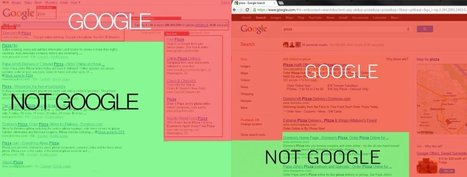











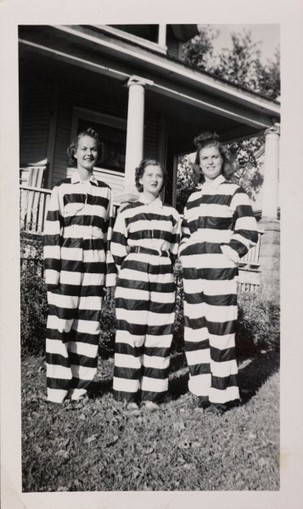
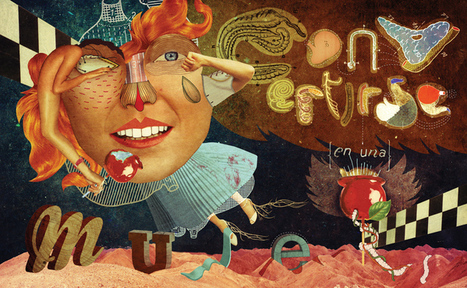

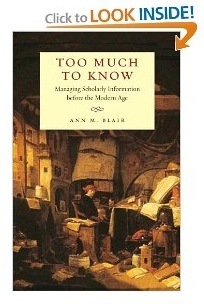
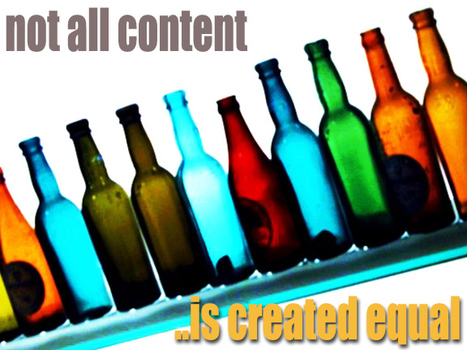



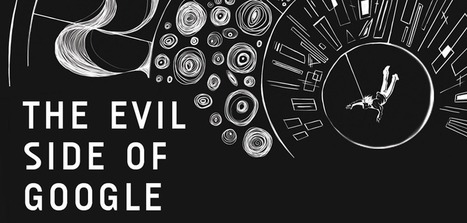







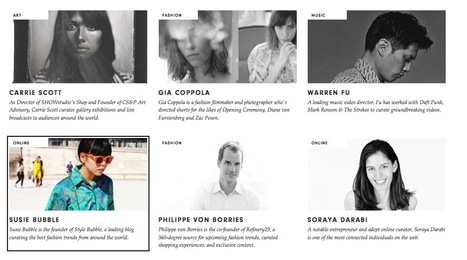











Put simply - Google (and for that matter any commercial search engine) may skew search results to promote their own commercial interests. The question to ask yourself is "are the (search) results good enough?" - I'd say in Google's defence "yes they are".
Reading time: 5mins
https://plus.google.com/+PaulMathewsWSI/posts
167